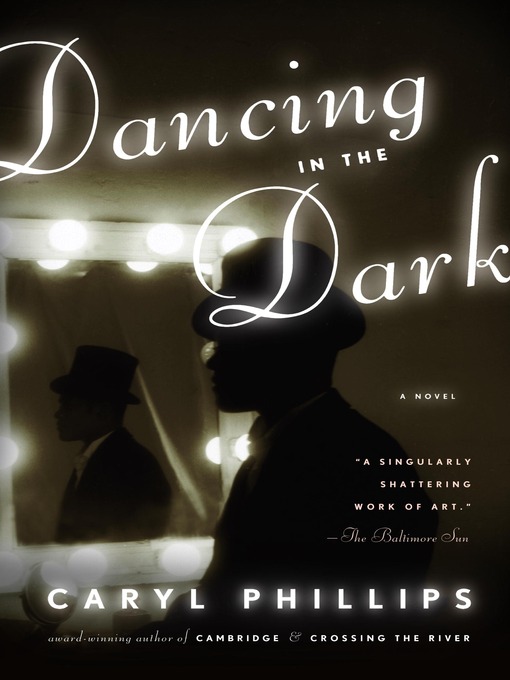
Dancing in the Dark
- اطلاعات
- نقد و بررسی
- دیدگاه کاربران
نقد و بررسی

Starred review from July 11, 2005
Picking up from the cultural criticism collected in A New World Order
(2001), Phillips goes one step further, imagining himself into the life of Burt Williams (1874–1922), a vaudeville performer who became, in the turn-of-the-century years before Jack Johnson's championship, the most famous of black Americans. The result is not so much a novel as a loving biographical fiction, one in which Phillips, perhaps channeling Williams's natural (and often challenged) sense of dignity and propriety, shows the more humiliating aspects of his life in a kind of half light. Williams was the first black performer to don blackface and was a master, with partner George Walker, of the cakewalk. Phillips is amazing at rendering the wrenching contradictions of "playing the coon" as Booker T. Washington and W.E.B. Du Bois became prominent, and what those contradictions did to Williams's psyche—as well as to Walker's (who reacted very differently), and to those of their wives, Lottie Williams and Aida (née Ada) Overton Walker. Williams's life—emigration from the Bahamas; hardscrabble youth marked by racism; hard climb to stardom; relatively heavy drinking and dissipation; early, childless death—emerges piecemeal. Beyond a few set pieces, Phillips shies away from a full-on dramatization of Williams and Walker's stage act. (He includes some verbatim dialogues, songs and contemporary reviews instead.) The whole is suffused in Phillips's brilliant, if here filigreed, light.

Starred review from September 1, 2005
This novel centers on the life of Bert Williams, the black vaudeville performer of the late 19th and early 20th centuries. He and his partner George Walker performed to wild acclaim on New York City and London stages, with Williams often donning blackface. While Williams was allegedly a quiet and celibate man, reading for long hours or brooding in a bar by himself, Walker earned the reputation of a strutting, philandering idol. Caribbean-born like Williams, Phillips ("A Distant Shore") deftly handles this friendship of polar opposites as well as the racial and moralistic aspects of its ascent and decline. The novel shifts among the perspectives of Williams and his wife, Lottie, and George Walker and his wife, Ada, in low-key yet resonant prose. Phillips is able to conjure up, among other things, the act of dying in poetic and haunting images. His new work is a beautifully told, sad, and meaningful story, and is highly recommended for all libraries. [See Prepub Alert, "LJ" 5/1/05.] -Jim Coan, SUNY at Oneonta Lib.
Copyright 2005 Library Journal, LLC Used with permission.

Starred review from July 1, 2005
With each penetrating and resonant book, Phillips opens another window onto the paradoxes and suffering endured by people of color in white-biased societies. In his eighth elegantly restrained yet devastating novel, following " A Distant Shore" (2003), winner of the Commonwealth Prize for Literature, he transports readers to early twentieth-century Harlem and fictionalizes with profound sensitivity and unflinching candor the outwardly successful yet spiritually disastrous life of Bert Williams, a trailblazing Bahamas-born performer. Phillips incisively compresses the facts of Williams' fascinating and tragic life to create a flexible framework for his exquisite rendering of the troubled psyche, not only of this dignified and misunderstood genius but also of George Walker, his gifted and ebullient partner (a dandy and lady's man who dreams of advancing the black race), and Bert's and George's long-suffering wives. Given Williams' phenomenal success--director of his own company, he mounts the first all-black Broadway production and becomes the first black star in the Ziegfeld Follies--one wouldn't expect him to be brooding, melancholy, and incapable of intimacy. The source of his soul-sickness? His gutsy decision to play the "coon" in blackface in order to disarm white audiences and, hopefully, subvert and transcend derisive black stereotypes through artistry, a Faustian gamble that enrages the people he cares most about. Phillips' empathetic interpretation of the lives and dreams of four courageous individuals illuminates the thorny and persistent dilemmas of artists of color, who still must struggle to stay true to themselves as they pursue mainstream success. Given the drama and beauty of his writing and the freshness of his insights into both personal and social conundrums regarding race and identity, Phillips is in a league with Toni Morrison and V. S. Naipaul.(Reprinted with permission of Booklist, copyright 2005, American Library Association.)




دیدگاه کاربران